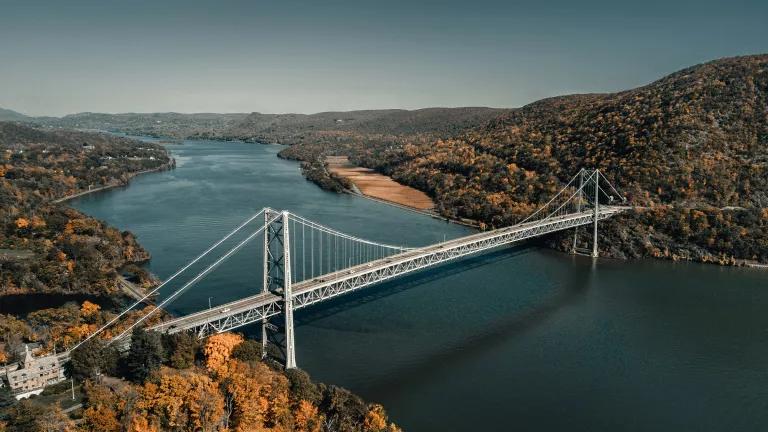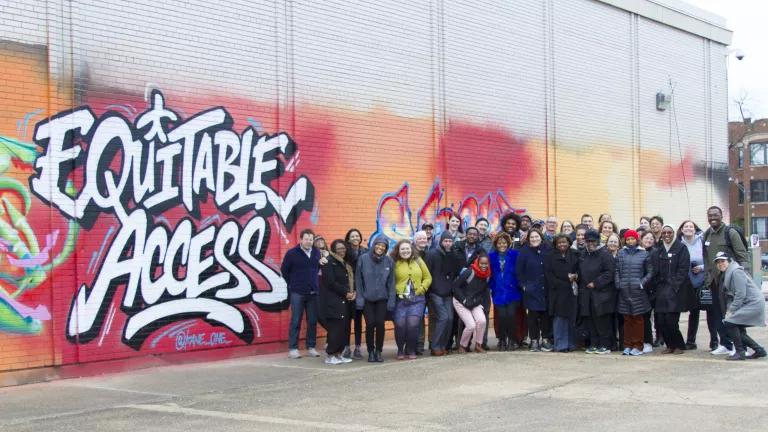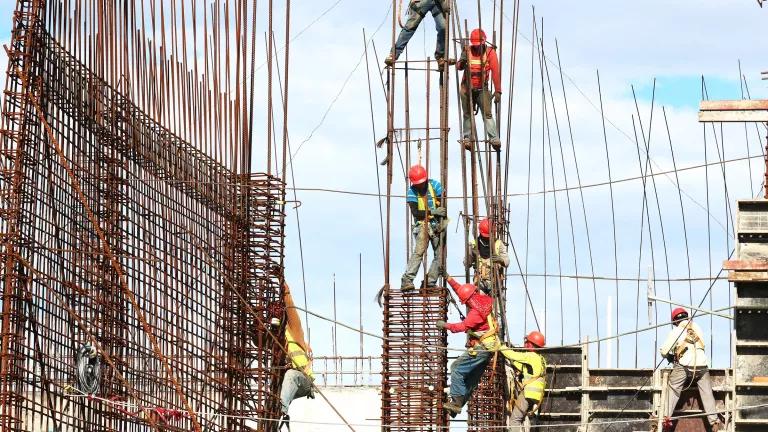Infrastructure Bills: Do They Meet the Moment?
Any legislation on infrastructure must address the backlog of repairs, the challenge of the climate crisis, and the inequities in our transportation system.

Bear Mountain Bridge, over the Hudson River, New York
Any legislation on infrastructure must address the backlog of repairs, the challenge of the climate crisis, and the inequities in our transportation system.
After years of big talk about investing in infrastructure, it looks like we’re on the verge of legislation to address a host of dangerous consequences of longtime neglect. As the American Society for Civil Engineers describes, we need it: 4 in 10 of our bridges would qualify for AARP membership, nearly 2 million miles of roadways are in poor or mediocre condition, and our transit systems have been woefully neglected.
But we can’t just repair what’s there and move on. We need to retool the system to play a part in solving two other crises rightly targeted by President Biden: climate change and persistent community inequity. The transportation sector is now the largest source of carbon pollution that drives climate change. And it is a pivotal factor in equity issues, with a history of dividing neighborhoods through racist siting of bridges and highways. Conversely, transportation can play a key role in delivering access to jobs and essential services, lifting up the prospects of Black and Latino households nationwide.
That’s why, as negotiations on infrastructure bills continue, Congress must be crystal clear about shared priorities for the transportation portion of any new policy and support legislation that meets the moment. Any legislation on infrastructure needs to address the backlog of repairs, the challenge of climate change, and the inequities in our transportation system.
Fortunately, the House of Representatives passed a strategic bill that tackles our scandalous repair backlog, racial and economic inequities, and the climate crisis: the Investing in a New Vision for the Environment and Surface Transportation in America Act (INVEST in America Act, or INVEST Act).
NRDC just sent a letter in support of the INVEST Act to congressional leaders from more than 100 local and national groups, calling for it to be the base text for any transportation bill. The letter also says that if the Surface Transportation Reauthorization Act of 2021 (STRA) serves as the basis of a legislative package instead, the following specific provisions from the INVEST Act must be added to comprise a real roadmap for a more equitable infrastructure framework.
A Comprehensive Performance Measurement Framework
The performance measures required by current laws have failed to yield a cleaner, more equitable transportation system. We need to prioritize measures that align with those goals. With transportation being the top source of pollution driving climate change, transportation planners should track the greenhouse gas emissions impacts from proposed projects.
To ensure that transportation is providing equitable access to opportunity, regardless of zip code, income level, or disability, agencies should be measuring how well their systems connect people to jobs and essential services. States and metropolitan planning organizations (MPOs) should be setting targets for improvement and prioritizing projects consistent with those targets. The INVEST Act establishes such a framework and provides new funding and incentives to help states and MPOs track and improve their performance on these critical goals.
Highway-level Commitment to Transit, Including Funding for Operations
For the past 40 years, transit has received only $1 for every $4 that has gone to highways. This imbalance has led to inadequate transit service, skewing consumers’ transportation decisions toward solo driving. Transit funding must be significantly increased to reach the highway level. The INVEST Act makes a down payment toward parity between highways and transit and includes two new programs—the Transit Deserts and Carbon Reduction Programs—that can be used to support better transit service, a goal that is also advanced by Representative Hank Johnson’s Stronger Communities through Better Transit Act (H.R. 3744).
Focus of Federal Highway Funds on Maintenance
The nation faces a road repair backlog of $435 billion, yet federal highway funds are not dedicated to this purpose. Instead, states can use federal dollars to build or expand highways, even as existing roadways fall into disrepair. Before states can add road capacity and thereby encourage more driving, they should be required to create a plan for maintaining any new road as well as the rest of their system (as the INVEST Act would require for projects using funds from the National Highway Performance Program).
Zero-emission Vehicle Facilities and Infrastructure
Federal policy should support deployment of charging and fueling infrastructure for all zero-emission vehicles (including scooters, bikes, cars, buses, and trucks) that ensures access to public charging in all locations as well as charging at all types of homes and businesses, with particular attention to communities facing transportation-related pollution burdens, low-income communities, and communities of color.
Transit agencies and local governments will also need support to transition to zero-emission fleets, including funding for facilities and workforce training. Building out the EV charging network necessary to support the transformation of the U.S. vehicle fleet is estimated to take $40 billion. STRA authorizes only $2.5 billion for fueling and charging infrastructure and includes natural gas fueling, which is not zero-emission, while the INVEST Act includes more than $36 billion for EV charging infrastructure and dedicates a portion of that funding for infrastructure in underserved communities.
Reconnecting Communities Program
It is past time to fix the historic damage wrought by urban highway construction that has divided Black and Latino communities. Dedicated funding is essential to right those past wrongs and tie communities back together, while ensuring that current residents benefit from the improvements and are not displaced. STRA includes a small program ($500 million over five years) for this purpose, but additional funding is needed, as recognized by the $20 billion included for this purpose in the American Jobs Plan.
Safe Streets for All
Our roads and highways are becoming increasingly dangerous for those outside of a vehicle, especially Black and Indigeous People. Congress should provide significant investment in safer infrastructure for those who bike, walk, or roll and require updated roadway design standards that provide safe accommodation for all. While STRA includes new funding for biking and walking infrastructure and requires transportation plans to include active transportation, we also need provisions from the INVEST Act, which prevent states from diverting bicycle and pedestrian funding for other purposes and from setting safety targets under which traffic deaths would increase.
A Stronger Role for Local Governments
Cities are hotbeds of innovation in transportation, yet they are not directly eligible for more than 99 percent of federal transportation funding, which is mostly channeled through state departments of transportation and, to a lesser extent, MPOs. The INVEST Act provides local governments with greater authority over the design and selection of projects within their borders as well as additional opportunities to directly receive federal funds.
In addition to all these critical components, a bill should exclude provisions that make it harder to stay on the path toward a system of good repair, a stable climate, and real equity. Specifically, as we say in our letter:
Transportation legislation must also maintain environmental safeguards by preserving and enforcing our nation’s bedrock environmental protections rather than sacrificing them in the name of infrastructure “streamlining.” The National Environmental Policy Act (NEPA) remains a critical federal screening mechanism to ensure that climate, environmental, and community impacts are considered, and it raises the voices of overburdened communities in project decisions prior to their being finalized. NEPA, which was signed into law by President Nixon and remained largely unchanged during the tumultuous recent era of environmental rollbacks, must remain intact. This is not the time to undo 50 years of progress and cut communities out of decision-making.
These commonsense provisions will help ensure we do more than spend a lot of money—they will help us reach our destination: a system entirely in good repair, a climate crisis averted, and a more equitable economy and society. Let’s get to work.


